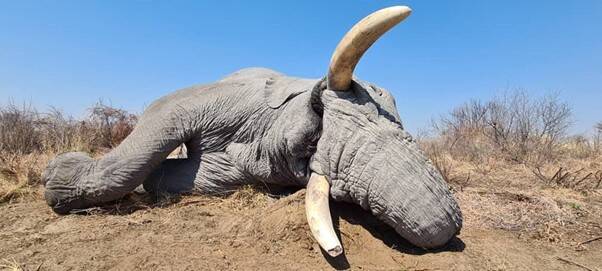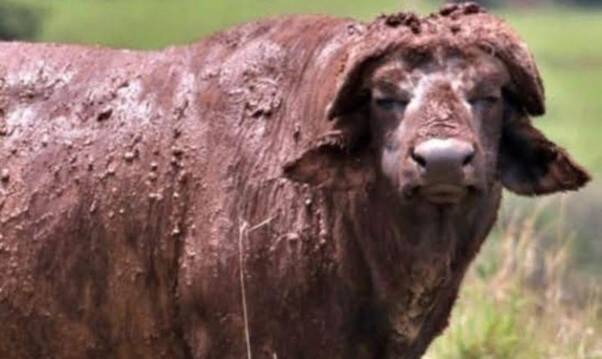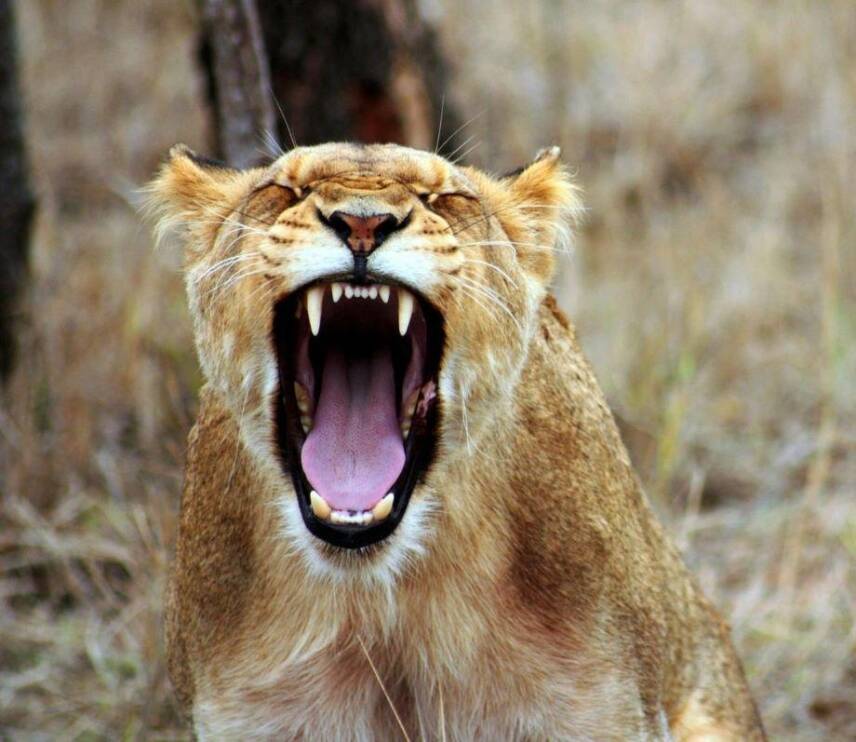The fire is burning down, red coals glowing on a cool African evening. Cold beverage in the hand and sleep only a few hours away. Muscles aching after a long stalk, but the smile of victory is evident in the evening shadows.
With the sounds of Lions and Hyena echoing over the savannah on the last evening of your hunting safari, and you lean back and think, what is going to be next on the hunting agenda?
You know that only after a few days of being back home, the call of Africa will resonate at random moments. It would be wise and best to lean back and ponder future safari hunting options now and in the moment, but where to from here?
Having successfully hunted various plains game species, maybe it is time to step up the game into the realm of dangerous game hunting, always a good option for consideration.
[DYNAMIC-BLOGTABLEOFCONTENT]
What are the dangerous 5 in Africa?
The dangerous 5 in Africa, more commonly known as African big five, comprise of the following species:
- The African Elephant
- Lion
- Cape Buffalo
- Leopard
- Rhino (which is either the White or Black Rhino)
Big Game hunting in Africa in the basic definition and understanding of the phrase include the above five species. Interpretation of these keywords is however subjective, and can include hunting large antelope such as Sable, Roan, Bongo and the “Gray Ghost,” namely Kudu, to name but a few.
Dangerous game hunting traditionally includes the African big five, plus the Crocodile and of course Hippo hunts. In Africa, not everything is always as it seems!!
As the tales tell, dangerous game hunting in Africa is the stuff of true legends. Libraries are full of the stories and hunting adventures of famous big game hunters such as Frederick C Selous, Walter Bell and Petrus Jacobs. How, for a few weeks can one not want to relive a portion of these great hunting safaris and cement your own small space in history?
When planning a dangerous game hunting safari, a good place to start is always with the direct and secondary costs and align with the desired experience.
Cost Factors playing an important role when booking big game hunting trips.
- The duration of the hunting safari as the hunter will need to factor in the daily rates.
- Method of hunting which will be applied i.e., baiting, hunting with hounds etc.
- The quality of the trophy i.e., bigger, comes at a price and when big game hunting, size counts!
- Cost of international and possible domestic travel to reach the hunting grounds.
- The African destination and trophy fees.
- Shipping costs in conjunction with the size of the trophy and location of the trophy room.

How is dangerous game hunted in Africa?
In African countries, the traditional method of hunting is on foot. Fresh tracks are sourced and followed by members of the hunting safari. There may be instances where hunters do have a disability. As African outfitters are five star, they will go out of their way to assist as much as humanly possible.
Which is the most dangerous game hunting safari in Africa?
While all African game animals are dangerous and pose a risk, it is widely believed and agreed that Cape Buffalo hunting is the most dangerous. These animals have a bad reputation and would love nothing more than to gore and gouge the hunter to death.
African professional hunters (in most instances) are very well trained. In the instances where a wounded animal charges, a cool head and enough gun is required. In most cases, only a well-placed bullet in the head will stop a dangerous game animal.
Read our shot placement page for more about shot placement on dangerous game.
Whilst big game hunting in Africa, it is to be noted that the hunter often becomes the hunted.
Hunting the Dangerous 7 in Africa
Each animal presents the hunter with their individual challenges, based on location, terrain and hunting conditions. Costs of hunting safaris between species can materially vary. Hunting the big five is often considered as the pinnacle point of big game hunting.
Elephant Hunting
Elephant hunting is traditionally done on foot with many miles and hours often spent following the fresh tracks hoping that they meet up with a trophy Elephant. Male Elephants, with heavy tusks made of ivory are the desired trophy and often unique in their individual shape and character. The majority of African countries have set aside a quota for Elephant and a CITES permit is required when hunting Elephant.
Elephant trophies may not be imported into the United States and a few other countries. It would be advised to check with your hunting agent as to an update in terms of amendments.
For more about African Elephants read our page about Elephant hunting in Africa.
Cape Buffalo Hunts
Due to the affordability of Cape Buffalo hunts, plains game hunters often graduate to hunting Cape Buffalo, Africa’s Black death in search of the infamous “Dugga Boy.” Due to these action packed, and adrenaline filled safaris, Cape Buffalo hunting can become exceptionally addictive. Every Cape Buffalo hunt is different, and every trophy harvested unique in terms of shape, size, contours and character. Many hunters are focused on harvesting a “Scrum Cap” bull. In this instance, both horns have been broken off. Normally due to fighting.
Cape Buffalo are hunted by following large herds, or smaller groups of bachelor herds. Cape Buffalo herds in Africa are stable with population numbers in excess of 450 000.
Africa in fact has four species of Buffalo, but when dangerous game hunting is on the cards, Cape Buffalo is the first choice.
Cape Buffalo hunts can substantially vary in cost depending on the location. A fenced Cape Buffalo hunt in South Africa can cost as little as US $9000 for a seven-day hunting safari. In other African countries offering “free range” Cape Buffalo hunts, the safari price can double.
For more information read our blog on fenced vs. unfenced buffalo hunts.

Lion Hunts
Lions are hunted in most African countries, but the cost of “Free Range” Lion hunting is exponentially increasing due to the number of free range/wild Lions decreasing. Habitat is being lost due to human encroachment and according to Oxford University’s Wildlife Conservation Research Unit, only 24 000 wild Lions remain. Many African countries are making a conservative to enforce the principal that only Lion over the age of six years may be hunted. Judging the age of a Lion is obviously not an easy task.
Fenced or “Canned” Lion hunting does take place in South Africa where Lions are bred purely for the purpose of being hunted. Once mature, they are sold off in a specific class category, namely class 1 to 4. Lion hunting in South Africa remains the most affordable safari and can cost the hunter between US $8500 and US $12000.
Which country has the most Lions?
Tanzania has the most wild/free Lions.
Read more about Lion hunting in Africa.
Leopard Hunts
Leopards are one of the most difficult of the African cats to hunts. These cats are illusive and highly intelligent and extremely dangerous when injured, so best the hunter ensure that the first bullet is well placed and ensures a quick and humane death. Read more about leopard shot placement.. A wounded Leopard will y and wait for the hunter and then “hell on earth” will be unleashed by this amazing animal.
Leopard hunting is normally done by baiting in multiple areas and then shot at night using artificial lighting. Leopard hunts with hounds are still conducted in the African countries of Zimbabwe and Mozambique.
The most affordable Leopard hunts are offered in Namibia. CITES has granted permits for approximately 200 Leopards to be hunted in South Africa every year. However, over the last few years the South Government has failed to issue any.
Leopard hunting safaris are normally over a period of twenty-one days. It is suggested that the Leopard hunting safari include endemic or exotic plains game. Another favorite to add on is Hyena hunting as these nocturnal animals share the same habitat with Leopard.
Hippo Hunts
Hippo hunting is fast becoming one of the most sought-after dangerous game hunting safaris, especially when the Hippo hunt is conducted on land. Do not for a second underestimate Africa’s “Water horse.”
Hippos are found in swamps, waterways, rivers and lakes throughout all Southern African countries and the number of wild Hippos is estimated at over 20000. This of course exclude the +- 150 of Pablo Escabar’s Hippos that are wondering around Colombia.
Hippos, while mainly aquatic are highly aggressive and surprisingly quick. Hippo hunting makes for a great safari. It is estimated that Hippo in Africa kill between 500 and 3000 people per year.
The most affordable Hippo hunts are in Namibia and Mozambique. Understanding hippo shot placement, especially when hippo hunting takes place on land vs. in the water is critical.
Read all about Hippo shot placement.
Whist recovering and processing your trophy Hippo, remember the water is going to be full of blood calling in every crocodile in the vicinity. Ensure that your rifle is loaded and withing reach at all times.
Crocodile Hunting
Crocodiles kill thousands of people every year in Africa. This Apex predators are perfectly designed killing machines and their tiny golf ball sized brains are only focused on one thing, KILLING.
Crocodiles are exceptionally stealthy predators hunted in the waterways by either spotting at a distance using a Makoro, or baiting. Baiting will be done in an attempt to lure this monster out of the water onto more solid ground, hoping to improve the chance of a kill to the brain.
When crocodile hunting, the beast has to be anchored. A poor shot may see the hunter losing the trophy in the murky swamps and riverways. Remember, when you are out crocodile hunting in the reeds and thick grass, the hunter is also the prey. It is imperative that the hunter is fully aware of what is happening in the surrounding areas.
The most affordable crocodile hunting safaris are in Namibia, South Africa and Mozambique. Mozambique is famous for regularly producing big crocs over fifteen foot.
Crocodile hunting is highly recommended, and the safari is really challenging. Not physically, but the emotional and the stress of taking “the perfect shot” can be exhausting.
Rhino Hunting (White and Black Rhino)
Rhino hunting in Africa takes place on foot, following tracks and then hopefully meeting up with what can only be described as “a military tank.”
Rhino hunting safaris these days are really expensive, especially when considering hunting a Black Rhino. CITES issues very few tags per year for Black Rhino and these Rhino hunts are often sold on auction.
White Rhino hunting is only offered in South Africa and Namibia and a Rhino hunting safari will cost the hunter between US $20000 and US $ 26000. This cost can of course increase based on the size of the Rhino.
Shot placement on a Rhino is critical. Only a frontal brain shot will stop a charging Rhino.
Read more about Rhino hunting in Africa.
African plains game animals, not always docile and predictable.
When we talk about dangerous game hunting safaris, hunters tend to categorize in the traditional sense and only include the members of the dangerous 7 in Africa. The reality is that all African hunts can be dangerous, including plains game hunts. These antelope are dangerous and unpredictable and armed with sharp and tough horns which can easily penetrate into human or animals’ vital organs.
Plains Game Incidents
The below are a few examples of incidents where over the years, humans have been killed by animals excluding the dangerous 7 in Africa.
- In December 2013, a farther and son were tragically killed when charged by two Black Wildebeest. While the mother ran to get help, the daughter also sustained wounds to her torso and face.
- In May 2010, a woman of 25 years old was killed by a Giraffe when out walking her dogs in the Limpopo Province in South Africa.
- In Namibia in 2012, a man was killed by a Kudu Bull in the Mururan Village, south of Rundu.
- In 2022, a man was gored to death by an Eland in Stockholm animal park.
- In January 2013, a Nyala killed an elderly woman who was trying to feed the antelope. The Nyala bull stabbed his horns into her right upper leg, causing the lady to “bleed out.”
- In 2021, Tristan Kelly and his daughter were attacked by a Nyala Bull in the Timbivati Reserve in South Africa. The Nyala Bull came out of nowhere, attacked twice resulting in Mr. Kelly’s leg and stomach being punctured.
- In 2006, an American was killed in the Gobabis area of Namibia by a Gemsbuck (Oryx) while out to take some pictures.
- In March 2024, a man was killed in the early hours of the morning by a Bushbuck in the Zambezi Region of Namibia.
The reality is that there are countless instances where woman, children and men are killed by African plains game animals. Dangerous game hunting thus encompasses all African animals, and no matter how small, do not forget that.
Remember, a SCI award winning tiny ten member, has survived for years surrounded by all types of predators, including the dangerous 7 and their smaller predator colleagues.
Bow Hunting Dangerous Game
Dangerous game hunting are available for bow hunters. There are, however, strict limitations and regulations in terms of arrow weight, type of broad head and of course the minimum draw weight.
There are different legal regulations in every African country and before booking the dangerous game bow hunting safari, check with your Safari Booking Agent.
What is the minimum caliber to be used when dangerous game hunting in Africa?
Different countries do have different rifle caliber minimums, so again check with your Safari Booking Agent. A general big game minimum is a .375 H & h loaded with 300 grain. It is often recommended to hunt with bigger calibers such as a .416 Rigby, .458 Lott, 500 Jeffery and any double caliber for up close and personal work.
When on a dangerous game hunting safari, there generally is no such thing as being accused of bringing “too much gun.”, the more stopping power the better.
Remember, when Hippo or Crocodile hunting, the rifle will need to be fitted with a good quality scope, shot placement cannot be overemphasized.
Conclusion. Choose the Dangerous game hunting safari. They are adrenaline filled and jam packed with action. Safari hunting for Hippo, Crocodile and Cape Buffalo are affordable and memorable.
Author: PC van Wyk
